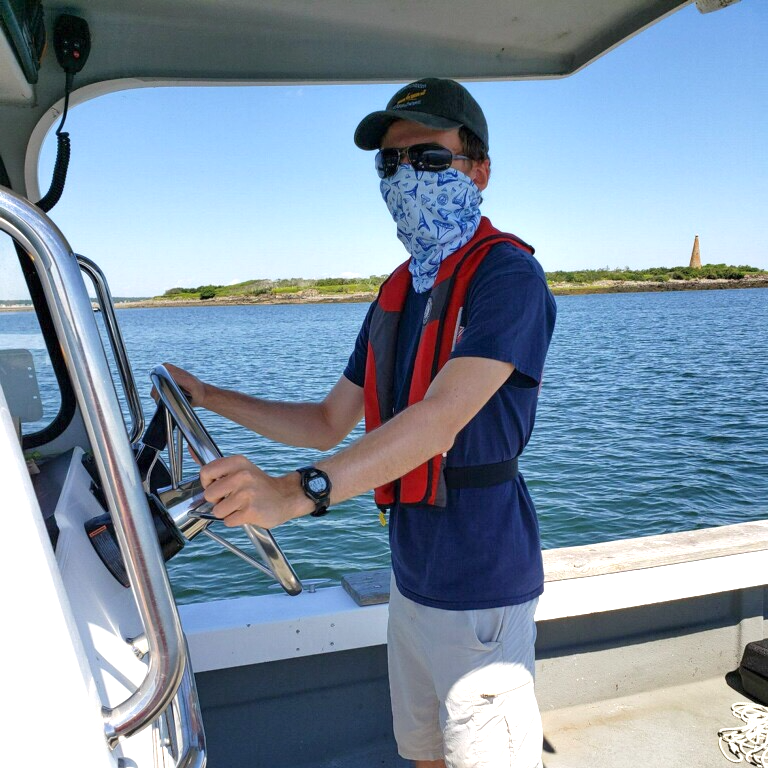
Andy Robinson, M.S. Marine Sciences 2021 was always a planner. When he started at UNE as an undergraduate in 2017, he knew he wanted to get involved in research, and he planned to pursue his master’s degree here as a student in the 4+1 Program for Marine Sciences. Since his first semester, he has worked with Dr. Charles Tilburg in the School of Marine Programs to develop and execute my own research.
“I have been investigating the currents in Wood Island Harbor, just to the southeast of UNE’s Biddeford campus. Studying how the waters of Biddeford Pool flow through this area, exchange over tidal cycles, and interact with the Saco River and Saco Bay will advance understanding of the water quality issues experienced in Biddeford Pool in recent years. To accomplish this, I developed and have been deploying GPS-equipped satellite-tracked drifters that track surface current velocities across the harbor. I combine my results from these deployments with data from aerial drone surveys and temperature-salinity profiles to completely describe flow.
Moving into 2020, I had a clear plan in mind to ramp up my field research, as I completed my bachelor’s degree and transitioned to being a graduate student. After only a few trips on the Arthur P. Girard Marine Science Center’s R/V Llyr this spring, I was faced with the suspension of in-person instruction on campus. Without knowing how long it would be before research would be impacted as well, I acted quickly to adapt my research for safety and efficiency.
Other graduate students and researchers were using the research vessels for sampling, so I began combining my drifter deployments with their research cruises, and vice versa. One person per project would be out on the boat, and we acted as each other’s research assistants. Consequently, social distancing could be accomplished much more easily than before, when a whole project team might be out on the water. In the spring, vessel operations have to be scheduled around weather and sea conditions, which greatly reduces the number of days when sampling can occur. Using time on the water to accomplish objectives for multiple researchers allowed me to sample more often than if we were each going out individually, and this strategy also minimized operating costs and the time spent working in-person for all involved.
With only 2 or 3 people out on the boat at one time, the experience I gained in March proved to be valuable preparation for resuming research once campus facilities reopened earlier this summer. My primary work environment is out in the field, which allows for lower risks than if I were doing lab-based experiments with a large research team. Even still, I have adapted procedures to ensure I am working as safely as possible. Use of the R/V Llyr has been supplemented with more frequent drifter deployments from kayaks to collect data for my project. The ability to remain socially distanced while working this way is far greater, and it allows me to conduct my research at a lower cost and in a more environmentally-friendly manner.
At the same time, I am beginning to train as a vessel operator at the Marine Science Center (MSC), so I can conduct my research with even greater self-sufficiency, and further reduce face-to-face contact with MSC staff. As we move closer to beginning the fall semester, I will continue my fieldwork and data collection, while also analyzing my observations thus far. I have discovered that Biddeford Pool and Wood Island Harbor are very dynamic areas, where winds and tides converge to produce strong flows, as well as interesting features like eddies and stationary waves. Once the area is dredged in the coming winter, research can be done by students in the future to discover how changing seafloor topography affects surface currents in our area.
From my perspective as a graduate student continuing to conduct research in the time of COVID-19, I can’t help but think of this time as a learning experience, providing personal and professional development. Collaboration with other graduate students has increased my knowledge of other disciplines within the marine sciences and helped me place my project within a broader ecological context. I’ve gained greater appreciation for and exposure to many of the people and processes that make academic research possible at UNE. Working with various administrative offices on campus to maintain funding, develop operations plans, and understand evolving policies has given me skills and preparedness for what I will encounter in the research career I plan to pursue after graduation. And I’ll be ready if life decides to steer those plans in a new direction as well.”
